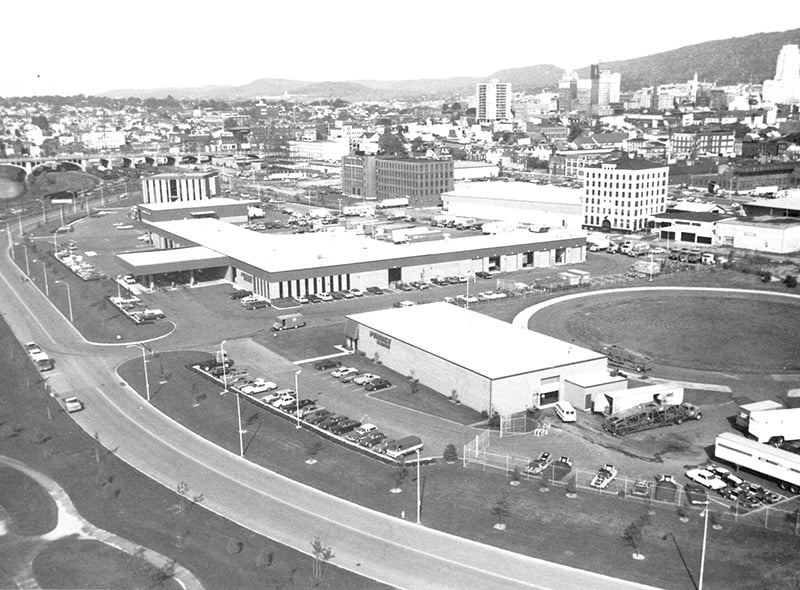
It was 287 years ago when Jacob Burcki stepped foot on colonial American soil and made his way to what would become Berks County.
It seems clear he wanted to make a name and life for himself in a new world. That inspiration drove the young farmer to leave the Kassel area of Hesse, in what is now central Germany, board a ship called “Hope” and embark for the port of Philadelphia, arriving Aug. 28, 1733.
Burcki reportedly told an acquaintance he was “going to Lancaster County.” Indeed, that iteration of Lancaster County was a big one – it was the first county created beyond the original three Pennsylvania counties of Bucks, Chester and Philadelphia. And the Bern Township he was headed for would, in time, become part and parcel of the Berks County created out of Lancaster.
He had a land warrant issued by agents of William Penn for the Bern property on which he settled, though it’s unclear if he purchased that warrant in Europe or after his arrival in Philadelphia.
On path to that farm, Burcki also spent some time along the way in what would become Bally Borough and Centre Township. In doing so, he apparently got to know colonial Berks pretty well.
Whatever future hopes he harbored, young Jacob could never have foreseen how a seventh-generation descendant and that man’s son and grandson would make the family name – anglicized to Burkey – one that would dominate the Berks’ building inventory from the mid-20th century into the first fifth of the 21st.
Post-war Entrepreneurship
A member of that seventh generation, Grant Burkey, in 1946, put his construction knowledge and work ethic into full gear as the victorious nation emerged from World War II and into an era of optimism and prosperity. The remarkable extent to which Burkey would boom and Berks would suburbanize is a story that goes far beyond a simple, albeit impressive, 75th anniversary mark.
Interestingly, Grant Burkey got his namesake company started with another name, Ephrata Construction Inc., and concentrated on residential work. In 1947, the company built the Cedar Courts townhouses which still stand handsomely along E. Walnut Street in the borough. The two-story houses, usually three-bedroom, one bath averaging 1,100 square feet, were just the ticket for young couples and their children.
But, both the name and the direction of Grant Burkey’s firm would soon change.
As residential construction took off, commercial construction practically boomed. Back in Berks, the company got its first commercial contract to build the Angelica Store in Cumru Township. Grant and Bob Sullivan, who then owned Sheerlund Forest, formed a partnership called Center City Construction.
Stronger together, they built the Hampden House (now Autumn Park) apartments in suburban northeast Reading in the early 1950s. The units, offering from one to three bedrooms, boasted hardwood floors as well as available garages for tenants. Constructed to respect its upper middle-income neighborhood, the traditionally styled two-story structures had brick- or fieldstone-clad exteriors and were situated on nicely sized lawns. In the 1960s through the 1970s, they attracted many young professionals just starting out or retirees wanting to downsize but remain local.
After a few more Sheerlund projects, Grant Burkey went on to create his namesake company.
Among the local landmarks in which Burkey played a role in those days were the Met-Ed building expansion in Muhlenberg Township, the Antietam, Muhlenberg and Shillington shopping centers, the Western Electric building in Muhlenberg, the Gilbert Associates building in Reading, and Immanuel United Church of Christ in Shillington. All remain and continue to be utilized.
Burkey also reached into the academic realm, constructing a number of schools to accommodate the growing Baby Boomer population, including the innovative multi-building C.E. Cole Junior High Complex and the classic mid-century sprawling Riverview Park Elementary School, both for the Muhlenberg Township School District. The company also built the Albright College Library and Chapel in the early 1960s. Burkey would also go on to construct the college dining hall, North Hall dormitory, and build and subsequently renovate the Rockland Building at N. 13th and Rockland streets.
All in the Families
Grant Burkey developed business relationships that would continue for generations.
One of those was with the Boscov family, starting with Solomon Boscov, who began the department store dynasty, continuing with the legendary Albert Boscov who grew it into a multi-state powerhouse.
Burkey Construction, in the 1960s, renovated the original Boscov’s Department Store at Ninth and Pike streets. Burkey served as the general contractors for Boscov’s North and West, as well as other stores expanding beyond as far as Delaware, New Jersey, New York, Virginia and Connecticut, to name a few.
Eric Burkey and Rick Burkey, Grant’s grandson and son, respectively, reflected on the relationship between Albert and Grant.
“My grandfather and Albert would shake hands and work would get started,” Eric says. “We have newspaper articles that chronicled the progress and the timeframe of a store. In 16 weeks after the handshake, the store was completed.”
Rick reflected on the scarcity of paperwork involved in the early Boscov’s projects. Albert would make changes in designs mid-project and Burkey would build to accommodate those changes.
“It’s amazing to see how everything has evolved from when I started out,” says Rick. There is so much paperwork now. When I started, handshakes pretty much sealed the deals. Now, even the paperwork is different – it’s digital.”
Among the other intergenerational business associations are those with the Fox Theatre family and the Penske family. In both cases, that has involved construction projects outside Berks as the firms expanded their footprints. Still, says Rick, one of the more treasured photos in the company headquarters is that of Grant, Roger Penske, and former Reading Mayor Eugene Shirk breaking ground for the Penske Racing Building along Riverfront Drive in Reading.
New Generations Step Up
Rick joined his dad’s company in 1969 after earning a degree in civil engineering from Lehigh University in Bethlehem. Through his tenure, he also served 27 years in the Air National Guard, 193rd Special Operations Group, stationed out of Middletown. A strong work ethic was something Grant instilled in his son.
“My dad in those early years worked very hard,” Rick recalls. “There was so little money sometimes that he’d hock his car on a Friday just to make payroll. It wasn’t until later in his life, in the late 1950s or early 1960s, that we could start to take family vacations to a hunting and fishing club in the Poconos.”
That club, the Porter’s Lake Hunting and Fishing Club, has remained the family’s beloved vacation spot. The Burkey clan has a boathouse there where family members go to relax and unwind.
Another venerable location is the family farm in Brecknock Township where Rick grew up.
“I still live in the old farmhouse,” he says with a smile.
The maintenance of relationships – familial and corporate – is a hallmark of Burkey Construction. Eric joined the company after graduating from Susquehanna University and following up with a construction management degree from Penn State. Though Rick officially retired in 2011, he still comes to the Morgantown Road headquarters almost daily “to help Eric out with the real estate.”
The nurturing of business relationships has sustained Burkey Construction through several recessionary cycles. Also, the diversity of its client base has contributed to the long-term success. During one of those down cycles, for example, upticks in manufacturing created the need for more structures.
“We don’t have just one niche,” says Eric. “That just makes sense, to be involved with a wide variety of clients and industries.”
Among the notable 1980s-era Burkey projects were the renovation of the former Berkshire and Abraham Lincoln hotel, both at Fifth and Washington streets, as well as the construction of the first of The Highlands at Wyomissing buildings as the decade approached its close.
Rick recalls a visit by a former Berkshire Hotel employee during the renovation.
“The foreman let him in, and he said he was a bellhop there when the rackets reigned,” says Rick. “He said the mobsters would rent a full floor, and when certain guys came to town, the bellhops would be tipped $50 (big bucks in the 1920s through the 50s) to be quiet. He knew exactly where all the old lifts and elevators were located.”
2001: A Space-building Odyssey
In the early 2000s, Burkey continued to construct landmark buildings, including the Sovereign (now Santander) Operations Center at Fifth and Penn streets and the GoggleWorks Apartments, across from the arts center, at Second and Washington streets, again working with developer Albert Boscov through Our City Reading.
The company was also contracted to upgrade the old Rajah Theater on N. Sixth Street to the Sovereign (now Santander) Performing Arts Center.
In the late 1970s and early 1980s, Burkey constructed the Penn Square Center and what was originally known as the General Battery Building in the 600 block of Penn Street. Burkey also built the Wachovia Building across the street sited on the lot where the Pomeroy’s Department Store stood.
Three decades later in 2009, added to the Burkey new building list downtown was the innovative headquarters of the Berks County Community Foundation.
It is the first LEED-certified commercial building in Berks, and the BCCF and Burkey have garnered numerous accolades for it. LEED, the acronym for Leadership in Energy and Environmental Design, is the most widely used green building rating system globally. Those ratings offer a framework for environmentally healthy, efficient and cost-saving green structures.
The building boasts a green roof, radiant heating, cooling floors, and rainwater collection for internal and external use, among other nature-friendly elements. Eric noted even 90 percent of the construction waste on that project was directed for reuse or recycling rather than being dumped in landfills, a process that is both environmentally friendly and cost-effective.
“We were very proud to have our company be a part of the Berks County Community Foundation building at that time,” he says. “It’s state-of-the-art, and we played a major part in figuring it out. There’s nothing normal or ordinary about that building. We used our creativity and ingenuity.”
Since then, Burkey has also constructed LEED-accredited buildings at Opportunity House in north Reading, Berks Nature headquarters in Angelica Park, as well as a private residence in Berks.
Eric said, as much as is practicable, LEED applicable elements are incorporated into all of its traditional construction practices.
A Very Big Deal
The generational connections begun by Grant led Burkey Construction to one of its most recent and most expansive projects — Alvernia University’s PLEX.
Under Grant’s leadership, Burkey constructed St. Joseph’s Villa, a retirement home for St. Bernardine nuns, on the campus. Five decades and two generations later, the firm would undertake the growing institution’s most ambitious project to date.
It was in the fall of 2019, that the 100,000-square-foot Tom and Helen Flynn Complex for Recreation, Wellness and Health Sciences (PLEX), an academic and recreation hybrid facility, was completed.
Its academic spaces, classrooms and labs were designed to promote shared learning for a variety health care and human service fields. The complementary recreation spaces include a 70,000-square-foot field house consisting of a six-lane NCAA competition-level indoor track, four full-sized sports courts providing an indoor practice facility for a variety of athletic activities, strength-training facilities and locker rooms.
“This was an exciting project on so many levels,” says Eric. “I really love that it’s a place I can take my kids to see.”
Today, the company continues to add to and enhance the Berks building landscape – from a variety of suburban corporate parks to the innovative Tom Masano Mercedes dealership along Lancaster Avenue to a recently completed renovation of the former Pearle Vision Building adjacent to the Santander Arena at Eighth and Penn streets.
“It’s a beautiful project, and it will be a perfect location for a restaurant or craft brewery,” says Eric.
Burkey also built the Orthopaedic Associates of Reading building and renovated the building now housing the Sly Fox Taphouse in the old VF, now Knitting Mills, complex in Wyomissing.
Bringing it Home
Both Rick and Eric stress the local nature of Burkey and its contribution to the Berks economy.
“We know the importance of working with local businesses,” says Eric. “There can be more than 100 people working on projects when you consider subcontractors. With them participating, it has a bigger ripple effect on the local economy than dealing with out-of-town contractors who bring in their own people.”
The heart of Burkey Construction through its three-quarters of a century existence centers on its dedicated, often long-term employees and certainly internal and external personal and professional relationships.
“We don’t want to just do a client’s first job; we want to do the next job, too,” says Eric. “This is a very high-risk industry, and we’d like to be around for another 75 years.”
















